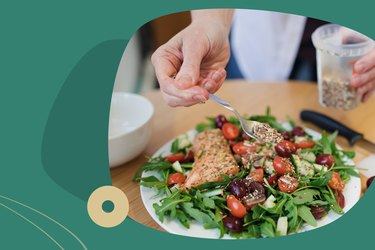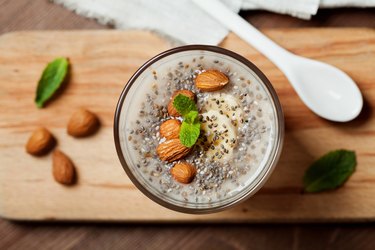
As anyone who's experienced death or loss knows, eating habits can change when you're going through a tough time.
"Everyone responds to grief differently," says Samantha Cassetty, RD, dietitian and chief nutrition officer for OMG! Nutrition. "It's common to lose your appetite and possibly lose weight, but it's also common to seek solace in food and, if this habit continues, potentially gain weight."
Video of the Day
Video of the Day
If your loss of appetite is extreme and you're struggling to eat a month or two after your grief began, it's a good idea to seek the help of a mental health professional, says Jeffrey Lichtman, PhD, a psychologist and chair of special education and Jewish education at Touro College.
And if you fall into the other camp and find yourself turning to food to help you cope, know there's a scientific reason you can't peel yourself away from the baked goods: Eating foods rich in sugars and fat release the pleasure-inducing neurotransmitter dopamine, according to a January 2011 study in Trends in Cognitive Sciences.
That makes you more likely to reach for cookies and coffee cakes when you're facing sadness, stress and a whirlwind of other emotions. You may also find yourself craving comfort foods, like a casserole that reminds you of your childhood. Those familiar tastes are the ones people tend to want during times of isolation or rejection, according to a July 2015 study in Appetite.
Indulging won't make you feel better for long, though. "If you're turning to less-healthy comfort foods in place of more healthful foods, you may miss out on nutrients and ultimately feel crummier," Cassetty says.
Here are six doable ways to help you prioritize nutrition — even when life feels out of control. Just don't expect your diet alone to heal your grief.
"Changing your diet won't take away the pain," Cassetty says, adding, "But if you eat well and try to treat your body like someone you love, you'll feel better overall."
1. Fill Your Plate With Plant-Based Foods and Fish
When you're grieving, it's easy to throw your usual healthy habits out the window — but it's best not to.
Your body needs essential vitamins, minerals and other health-supporting compounds to operate at its best, Cassetty says. And when you're grieving and forced to tackle difficult decisions and emotions head-on, it's more important than ever.
"Eating nourishing foods and a balanced diet can help you weather the stress of loss a bit better, have more stamina and sleep better so you'll wake up feeling rested and keep your immune system strong," Cassetty says. "Ideally, you want to focus on whole, plant-based foods, such as veggies, fruits, whole grains, nuts, seeds and pulses such as beans, legumes, chickpeas and peas."
Plant-based foods, plus fish, can have a positive effect on your mood. A study in October 2015 in Nutritional Neuroscience found reducing animal foods is associated with mood improvements and less stress and anxiety.
Specifically, omega-3 fatty acids — which are found in fish and some nuts and seeds — are linked to preventing mood and anxiety disorders because of their anti-inflammatory properties and their effect on the brain and the body's immune response, according to an August 2015 review in Clinical Psychopharmacology and Neuroscience.
There are specific foods and nutrients that get the job done. Essential fatty acids, magnesium, vitamin B6 and vitamin C are tied to reducing stress and anxiety levels primarily by lowering levels of the stress hormone cortisol in women, according to a February 2017 systematic review of 14 studies in The JBI Database of Systematic Review and Implementation Reports.
And complex carbohydrates (such as those found in whole grains and legumes) are a better choice than refined grains because they're metabolized more slowly, which leads to steadier blood sugar levels and a calming effect, according to Harvard Health Publishing.
Certain foods (milk products, fish, fruit and vegetables) have been tied to promoting good sleep, though more research is needed to confirm these findings, according to a September 2016 review in Advanced Nutrition.
Even if you can't sleep, eating healthy foods can improve your daytime function. A September 2019 study in the American Journal of Lifestyle Medicine found that physicians who stuck to diets that were high in plant-based foods and low in saturated fat and added sugars experienced less sleep-related impairment. Why? A healthy diet seems to regulate the circadian clock and aids in the synthesis of sleep-related hormones and neurotransmitters.
Keeping the body healthy is important since the immune system has been shown to suffer following the loss of a loved one, according to a June 2019 review in Psychosomatic Medicine.
2. Try Not to Rely on Comfort Foods for Comfort
Many of the foods that friends and family members send during difficult times aren't exactly healthy (looking at you, doughnut holes and cheesy casseroles).
"Though traditional comfort foods may bring a sense of nostalgia or coziness while you're grieving, if they're loaded with sugar, refined grains and excess sodium, they might undermine your energy levels and sleep process," Cassetty says. "So if you're routinely eating these foods, you can wind up feeling worse."
Simple carbohydrates, which are found in sugary beverages and desserts, are digested quickly. That means your energy levels may spike only to be followed by an energy crash, according to the American Heart Association.
Taking in too much salt and saturated fat, which are two prime culprit in comfort and processed foods, are both linked to sleep difficulties, according to a February 2015 article in the Journal of Sleep Research. However, nutrients in plant-based foods were associated with better sleep.
It's OK to indulge every now and then, though — no one expects your willpower to be ironclad when you're processing a new void in your life. "The idea is to balance out these meals with other, more healthful ones," Cassetty says.
When a hankering hits, here are 17 of Your Favorite Comfort Food Recipes Made a Little Bit Healthier.
3. Cut Yourself Some Slack and Embrace Shortcuts
No one expects you to shine in the kitchen during these times — your goal should simply be to squeeze healthy foods in however you can.
"It's time to be reflective and listen to what feels right to you," Cassetty says.
When Cassetty lost her mom earlier this year, she found it helpful to cook easy, veggie-centric meals, such as stir-fries using frozen vegetables as the base.
"This eliminates the need to prep the veggies, which can get tedious even if you aren't overwhelmed with grief," she says.
Add in a protein (such as scrambled eggs, grilled chicken or frozen shrimp) and sauce and serve as is or over brown rice, quinoa or red lentil spaghetti for a complete meal, she suggests.
4. Watch Out for Appetite Loss
It's perfectly normal to turn away from food in response to grief, but be on the lookout for something more serious. Loss may trigger the development of an eating disorder, says Samantha DeCaro, PsyD, assistant clinical director of The Renfrew Center of Philadelphia.
Reach out to a qualified eating disorder professional, such as a licensed mental health clinician or a registered dietitian, who can help you distinguish between the behaviors connected to grief and those that might be better explained by an eating disorder.
"They can help clearly identify what you're experiencing and develop an individualized treatment plan to help you cope during this difficult time," DeCaro says.
5. Supplement to Make Up for Lost Nutrients
If you find your desire to eat has disappeared, you may be missing out on key nutrients, which can negatively affect your response.
"Restricting food can compound the grief process, as malnourishment exacerbates fatigue and negatively impacts mood," DeCaro says. Consider taking supplements not to replace a healthy diet but to help fill in the gaps, Cassetty suggests.
She recommends taking a multivitamin and magnesium, which a December 2012 clinical trial in Journal of Research in Medicine Science found is linked to better sleep.
"When you've suffered a serious loss, you're under a lot of stress or you're otherwise just not eating an ideal, balanced diet, supplements can cover your bases," Cassetty says.
Tip
Talk to your doctor before taking any supplements to make sure they won't interfere with any mediations you take or lead to unwanted side effects, according to the Federal Drug Administration.
6. Avoid Picking Up Bad Habits
Cassetty says that times of grief, like other stressful situations, may lead some people to drink more than usual.
In fact, men were observed to be at increased risk of concerning alcohol consumption one and two years following the death of a loved one, a January 2012 study in Substance Abuse Treatment, Prevention, and Policy found. Interestingly, that link wasn't found among women. (Note: While this study uses binary language like "men" and "women," LIVESTRONG.com tries to use more inclusive terms, unless quoting a study or expert.)
Try to drink in moderation, which the Centers for Disease Control and Prevention defines as one to two drinks per day for adults.
If it seems you're becoming dependent on alcohol, consider speaking to your health care professional or seek assistance via SAMHSA's National Helpline at 1-800-662-HELP (4357).
- Trends in Cognitive Sciences: “Reward, Dopamine and the Control of Food Intake: Implications for Obesity”
- Appetite: “Threatened Belonging and Preference for Comfort Food Among the Securely Attached”
- Psychosomatic Medicine: "A Systematic Review of the Association Between Bereavement and Biomarkers of Immune Function"
- Substance Abuse Treatment, Prevention, and Policy: “Alcohol Use in the First Three Years of Bereavement: A National Representative Survey”
- Tragedy Assistance Program for Survivors: "Alcohol is Not the Answer"
- Journal of Research in Medicine Science: “The Effect of Magnesium Supplementation on Primary Insomnia in Elderly: A Double-Blind Placebo-Controlled Clinical Trial”
- Samantha Cassetty, RD, dietitian and chief nutrition officer for OMG! Nutrition
- Jeffrey Lichtman, Ph.D., a psychologist and chair of special education and Jewish education at Touro College
- Samantha DeCaro, Psy.D., assistant clinical director of The Renfrew Center of Philadelphia

